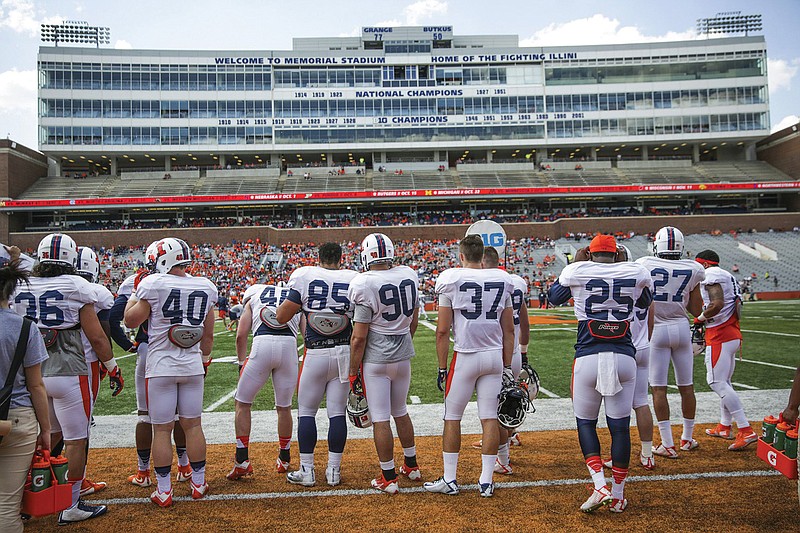CHICAGO - During the summer, Campus Gear owner David Haghnaji bought about 200 boxes of sweaters, T-shirts and knickknacks emblazoned with Northwestern University's wildcat logo, despite uncertainty about whether there would be a college football season.
Haghnaji's downtown Evanston store generates about 70% of its annual revenue from home football games and college events like homecoming and parents weekend. The Locker Room, another store he owns across from Ryan Field, makes about 90% of its annual sales during college football season. The majority of customers are first-year students stocking up on face tattoos and other paraphernalia before game day, he said.
The coronavirus pandemic means fewer regular-season games, eight versus 12 last year, with half of them at home. But it's not the number of games that is most troubling to merchants and municipalities in college football towns. It's the absence of fans - and their wallets.
"This year is the year of survival, and I hope we can make it through," Haghnaji, 62, said.
Each college football game can generate between $2 million and $3 million in spending, according to Robert A. Baade, an economist at Lake Forest College in Illinois who has studied the economic impact of large events.
The financial boost from football is often overstated, but certain businesses, like apparel shops and bars, benefit from the large crowds it attracts. The games also are moneymakers for stadiums' neighbors who rent driveways and lawns to spectators in search of game day parking.
The Big Ten Conference, which includes the University of Illinois and Northwestern, initially said it would cancel the season but later decided to move forward with a reduced schedule starting in late October. Other athletic conferences have established their own rules and schedules, and all universities are limiting the number of spectators at their games.
Businesses and college towns are trying to salvage the year by promoting safe and socially distanced tailgating and outdoor viewing parties. Some restaurants and bars are relying on outdoor dining. Still, many are bracing for a tough football season.
"There's not a whole lot we can do. We've been trying to think outside the box," said Mike Gerlach, who manages Bat 17, a restaurant and sports bar in Evanston.
NORTHWESTERN
Northwestern will play its first regular-season home game Oct. 24 against the University of Maryland. But Ryan Field, which can seat 47,130 people, will be mostly empty.
Northwestern is allowing each athlete and coach to invite four family members or friends to home and away games.
Evanston Mayor Steve Hagerty said the city estimates it will lose between $650,000 and $900,000 in tax revenue this year from the lack of athletic ticket sales. That contributes to a $12 million budget shortfall the city is projecting because of the pandemic. Evanston is making up part of the shortfall with cost-cutting measures like furloughs and layoffs, Hagerty said.
"They're going to play football, but it's pretty much being played for all of us to watch on television," he said.
The northern Chicago suburb has an economy that's diverse enough that it doesn't heavily rely on Northwestern and its sporting events, Hagerty said.
Still, a home game against a rival like Ohio State University, University of Iowa or University of Illinois could bring as much as $1 million in spending per game to the city, said Roger Sosa, executive director of the Evanston Chamber of Commerce.
Sosa said the chamber isn't widely marketing viewing parties at restaurants and bars because of Illinois' 50-person gathering limit, leaving it up to businesses to come up with their own plan.
NOTRE DAME
The economic pain of a scaled-down football season is on full view in South Bend, Indiana, where the University of Notre Dame is more than halfway through its home game schedule.
The university only allows students and faculty to attend home games, and the stadium's 77,622 seating capacity is never filled by more than 20%. Notre Dame will play 11 regular-season games, including six at home, just one less than last year.
"The tourism industry here has been decimated and then when you take away visitors who would come here for the very successful football program, it's even that much more devastating because there is nothing to replace that revenue," said Rob DeCleene, executive vice president of the South Bend Regional Chamber.
The Oliver Inn Bed and Breakfast, located about 3 miles from Notre Dame's iconic Touchdown Jesus, is usually sold out months in advance for each home game weekend, for which guests pay roughly double the standard $190 nightly rate.
The inn's occupancy rate has come back somewhat from its low of 10% in April, but last month it was still only about 40% full. Owners Tom and Alice Erlandson said they've had no other option but to refund football weekend deposits, cut their budget and hope they get through this year.
"It's our livelihood, our business. We have nowhere else to go," Alice Erlandson said. "We'll do what it takes to get to the other side."
Like the Erlandsons, other businesses near Notre Dame are hurting. The university, and its football program in particular, drive much of the city's tourism activity.
"When we're marketing this destination to travelers, we're marketing South Bend's best experiences, and there's no better experience in South Bend than the football experience," DeCleene said.
The university estimates that over the course of a season, home football games bring in about 660,000 visitors - more than six times South Bend's population - and generate spending of about $185 million in the region.
"It's been a tough year, even before football season entered into it," said South Bend Mayor James Mueller.
UNIVERSITY OF ILLINOIS
The University of Illinois at Urbana-Champaign's first home game this year takes place on Halloween and local business owners anticipate game day will look a lot different, and not because of the holiday costumes.
The college town normally welcomes more than 40,000 out-of-town visitors on home game days.
"The football season is one in a long line of events that have been outright canceled or scaled way back since COVID rolled into the region," Urbana Mayor Diane Marlin said. "There's a wider effect in terms of a tremendous impact on jobs like caterers and retailers."'
In Champaign County, where the University of Illinois is located, each home football game brings in about $3 million to the local economy, according to a Visit Champaign County study.
The Fighting Illini will play four home games compared with the usual seven or eight, in a mostly empty Memorial Stadium.
A mile down the road from the stadium is Gameday Spirit Fanstore, where owner Ryan Majeres sells team merchandise. Traditionally on home game days, which are responsible for a quarter of the store's annual sales, the store embodies the sights, smells and sounds of game day.
"We'll have band music playing, the game on TV and fresh popcorn," he said. "Pre- and postgame, the store is packed and people are full of energy."
This year will be a quieter experience with more sales coming from the store's website, according to Majeres. While the store's e-commerce growth has accelerated, it won't make up for the decline in bricks-and-mortar sales, he said.
NORTHERN ILLINOIS UNIVERSITY
DeKalb, home to Northern Illinois University, has been the only region under Gov. J.B. Pritzker's phased reopening plan to remain under strict rules since Oct. 3 that prohibit indoor service at restaurants and bars.
The university, which has its first home game Nov. 4, isn't allowing fans inside Huskie Stadium, which can seat about 24,000 fans. The team has six regular-season games this year, half as many as last year, and will play three of them in DeKalb.
When NIU plays a home game, city and university officials estimate it can generate between $250,000 and $500,000 in spending at restaurants, bars and hotels, said Mayor Jerry Smith.
"We are a community that is very tied into (Northern Illinois University), our biggest employer. We are joined at the hip, figuratively speaking," he said.
Matt Duffy, executive director of the DeKalb Chamber of Commerce, said that while outdoor dining is an option, the oncoming colder weather will be a challenge for business owners trying to keep fans warm.
"There's not much you can do without indoor service," he said. "Even if DeKalb were to have a zero positivity rate, it wouldn't be enough if cases remain high in other parts of the region."


